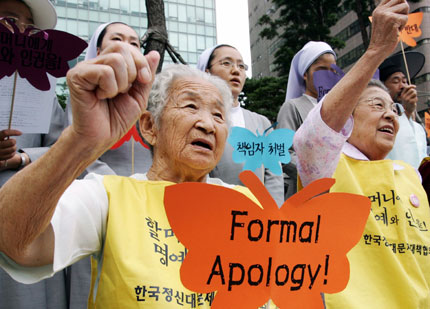Japan denies coercion of 'comfort women'
(chinadaily.com.cn/AP)Updated: 2007-03-16 16:52
The declaration coincided with moves by conservative lawmakers to investigate the issue and soften a 1993 government apology for pressing thousands of woman to work as prostitutes for Japanese soldiers in Asia.
The declaration was made in response to a question by opposition lawmaker Kiyomi Tsujimoto of the Social Democratic Party and was posted on her Web site. The Cabinet Office confirmed its contents, but refused to immediately provide a copy.
Prime Minister Shinzo Abe stirred criticism in Asia and the United States earlier this month when he said there was no evidence the women were forced into prostitution, despite testimony by victims that they were kidnapped and turned into sexual slaves.
Speaking to reporters at a press conference in Beijing March 6, Chinese foreign minister Li Zhaoxing said conscripting of "comfort women" is one of serious crime committed by Japanese militarists during the World War.
"This is a historical fact. I believe the Japanese government should face up to this part of history, take the responsibility and seriously view and properly handle this issue," Li said. "Truth is always simple and plain. Taking history as a mirror and be forward looking to the future is the simplest and most practical way to find solution to problems."
Japanese conservative ruling party lawmakers, in disregard of the historical facts, argue that the women were professional prostitutes and were paid for their services, and maintain that the military authorities were not directly responsible for the establishment or running of the brothels.
Abe, however, has declared that he stands by the 1993 apology by then-Chief Cabinet Secretary Yohei Kono to the victims after documents were uncovered showing military involvement in the brothels.
He said, however, that he would not issue an additional apology.
The issue has stirred debate in the United States, where a committee in the House of Representatives is considering a nonbinding resolution calling on Tokyo to fully acknowledge wrongdoing and make an unambiguous apology.
US Ambassador Thomas Schieffer said he hoped Tokyo would not attempt to alter the 1993 apology.
"I think every friend of Japan hopes that Japan would not back away from the Kono statement," Schieffer told reporters at his residence. "The push to revise it in whatever form seems to have lost its momentum."
The ambassador said it was clear the women were forced into the brothels during wartime, citing abundant testimony by survivors who said they were kidnapped by Japanese forces and turned into sexual slaves.
"I think they were coerced, that means they were raped by the Japanese military," Schieffer said. "I think the events speak for themselves."
Historians say as many as 200,000 women, most of them Asians, worked in Japanese military brothels across the region in the 1930s and 1940s. Japanese defense documents uncovered in 1992 showed the military had a direct role in running the brothels, which the government had previously denied.
|
||
|
||
|
|

